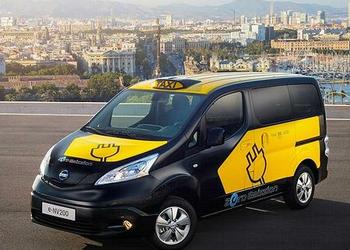
FRANKFURT, Germany, September 23, 2013 (ENS) – Nissan, maker of the world’s most popular electric car, the LEAF, rolled out its second electric model at the biannual Frankfurt Motor Show, which closed Sunday after a packed 10-day run.
At the show, Nissan President and CEO Carlos Ghosn presented the Nissan e-NV200 electric taxi for Barcelona in the presence of Barcelona Mayor Xavier Trias.
With a population of 1.6 million, Barcelona is the first city in the world to commit to employing the Nissan e-NV200 as publicly accessible transport. China’s automaker BYD also makes electric taxis.

Nissan and Barcelona City have signed a memorandum of understanding to promote the use of electric vehicles as taxis and as delivery vehicles by improving the quick charging network and enabling privileges for drivers of the zero emission vehicles.
Barcelona will lead the global rollout of the new e-NV200 electric taxi, which will begin production in 2014 in that city. The Nissan e-NV200 will be manufactured at the factory located in the Zona Franca in Barcelona from mid-2014 with an investment of 100 million euros and will create over 700 new jobs.
Ghosn said at the Frankfurt Motor Show, “We applaud Barcelona city for making this clear commitment to integrating the revolutionary Nissan e-NV200 electric vehicle into the city’s taxi fleet. We are delighted that the city where we will build this new vehicle is leading the way in promoting clean transportation for the benefit for all its citizens and visitors.”
The factory in Barcelona will be the single global manufacturing plant for the e-NV200; vehicles will be exported to other big cities around the world.
“The e-NV200 is a revolutionary product that will make zero emission taxis and goods delivery vehicles a reality in cities across the globe from next year,” Ghosn said.
The new electric light commercial vehicle is based on Nissan’s award-winning NV200 van, which also is built in Barcelona. It combines the architecture of the NV200 with the electric drivetrain from the Nissan LEAF.
Power is supplied is by a lithium-ion battery composed of 48 compact modules and a high-response 80kW AC synchronous motor that generates 207 lb-ft of torque. Unlike an internal combustion engine, the e-NV200’s motor delivers 100 percent of its torque from a standing start.
In a news conference at Frankfurt, Mayor Trias and Andy Palmer, executive vice president of Nissan, the mayor called the agreement “a step forward to reinforce the role of Barcelona as a leading city in zero-emission taxis and urban goods distribution.”

“We want to put the talent, creativity and innovation of Barcelona to support the new sustainability sectors,” said Mayor Trias. “This pioneering scheme and the technology developed for it and other sustainability projects like it will improve the welfare of the people of the city and create further employment opportunities.”
The mayor invited everyone to attend EVS27, the 27th International Electric Vehicle Symposium, coming up this November in Barcelona. He said the event is “a great opportunity to consolidate the strong investment and the good work that Barcelona is undertaking to promote the electric vehicle implementation.”
In the partnership agreement, Nissan commits to developing a specific taxi version and supporting the City of Barcelona with the deployment of a charging infrastructure.
Nissan will contribute to installation of the necessary charging infrastructure for the city by providing CHAdeMO quick chargers. The Nissan-designed chargers can recharge any compatible electric vehicle from zero to 80 percent battery in just 30 minutes.
Barcelona City Hall and the Metropolitan Area of Barcelona will install these quick chargers across the city to create a network for taxi drivers and others to quickly recharge.
These quick chargers are part of the over 1,200 scheduled to be installed across Europe by March 2014.
Nissan and the City of Barcelona also aim to encourage electric vehicle use in goods delivery. Under the agreement, the City Council will provide specific places for loading and unloading goods, enable electric vehicle charging points, and promote specific identification for electric vehicles.
The City Council also will consider the creation of goods delivery zones for the exclusive use of zero-emission vehicles. The city also plans to reduce business taxes on companies with fleets of electric vehicles.
Nissan expects incentives to encourage the use of electric delivery vehicles to appear in many other cities; several are considering restricting access to central locations to zero-emission vehicles.
Copyright Environment News Service (ENS) 2013. All rights reserved.
© 2013, Environment News Service. All rights reserved. Content may be quoted only with proper attribution and a direct link to the original article. Full reproduction is prohibited.
